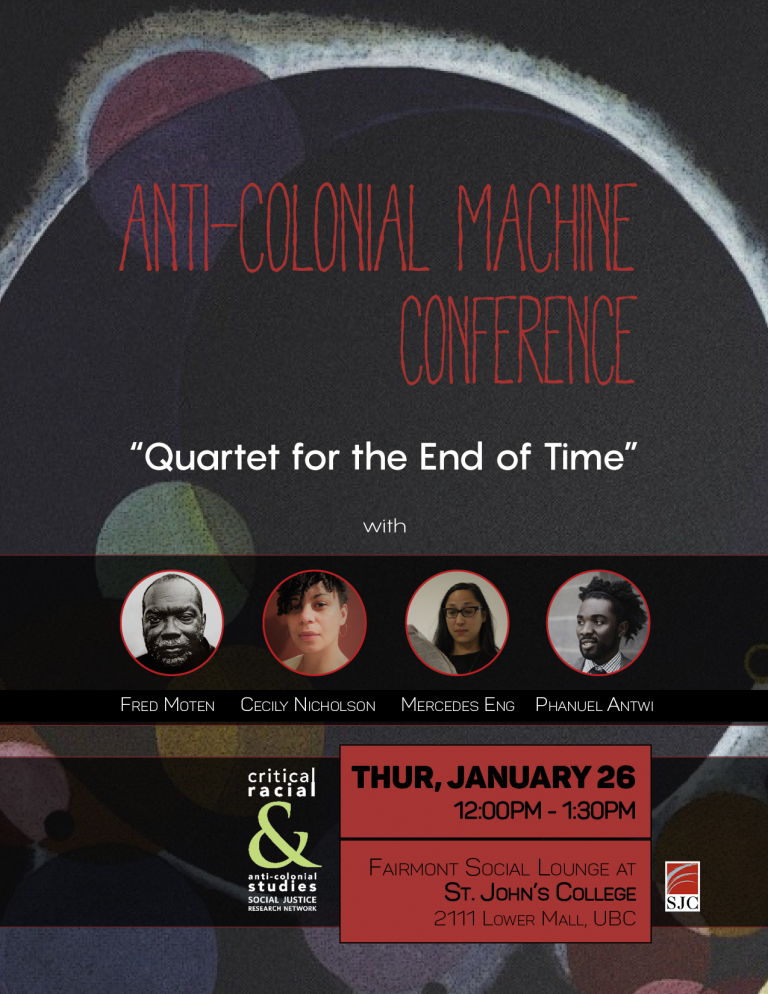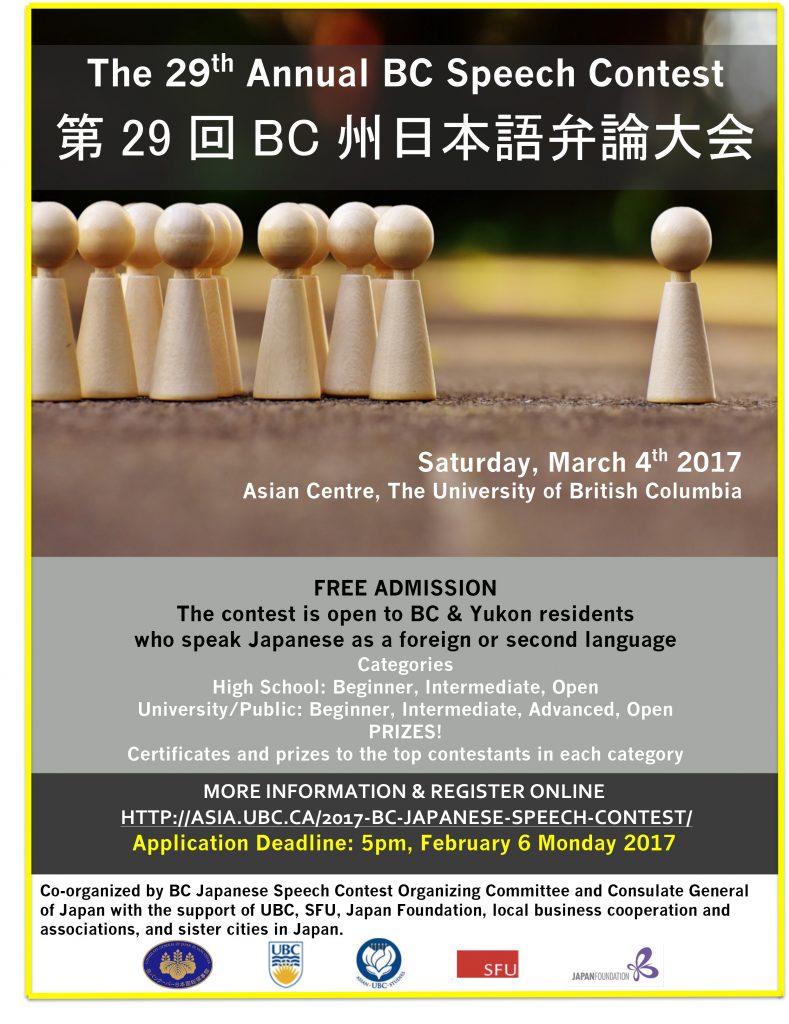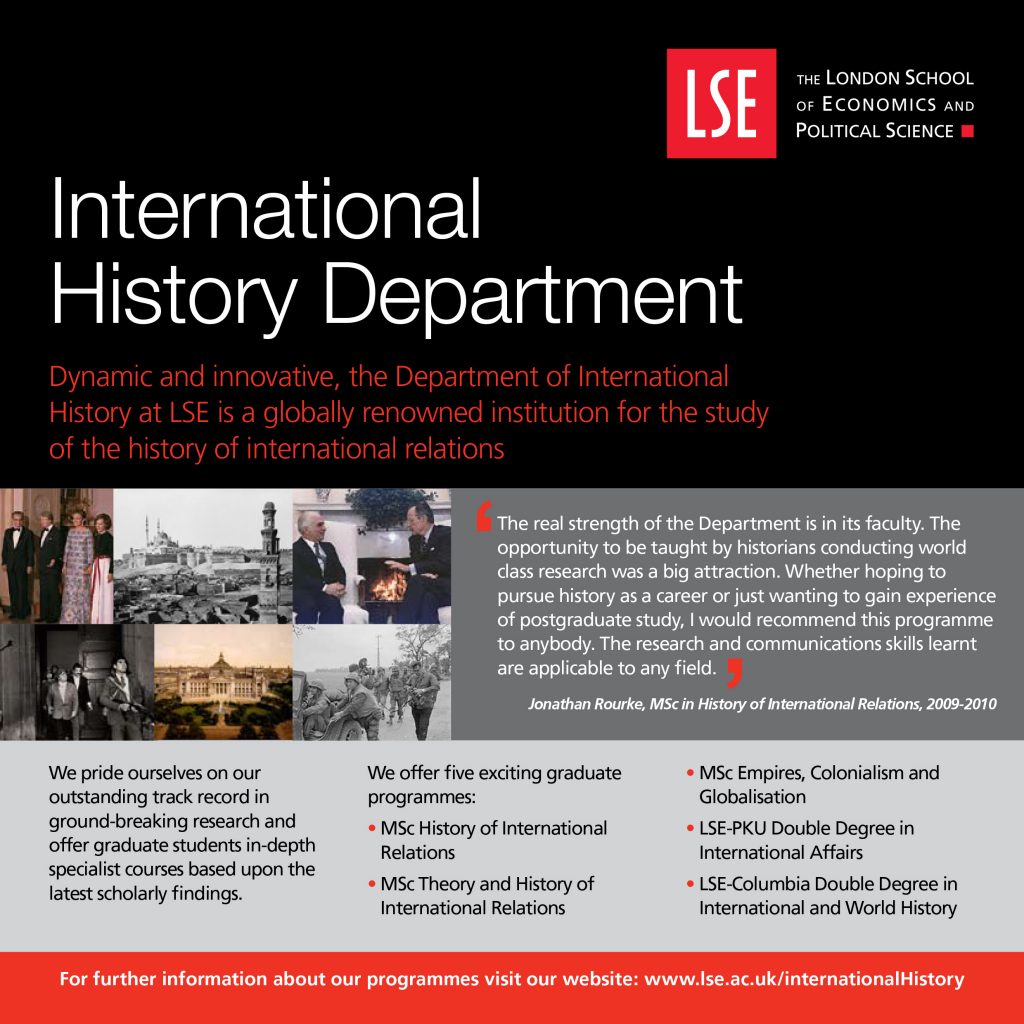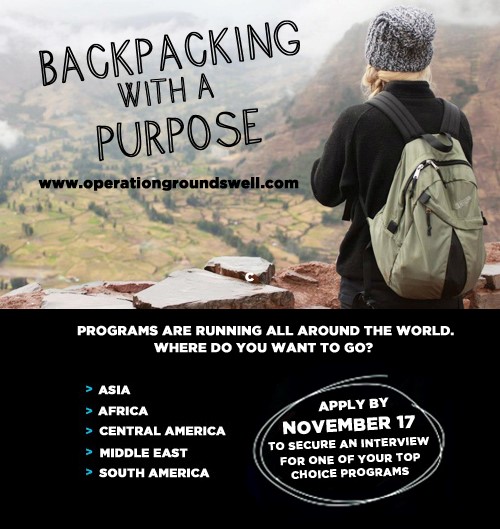Intensive Chinese in Taiwan – (CHIN 231: Basic Chinese II (Non-Heritage) and CHIN 233 as transfer from NTNU) This is a 6-week intensive Chinese language program taught in Taiwan focusing on using Mandarin Chinese in everyday situations on selected topics. Students will have 96 instructional hours in total with extracurricular activities. The extracurricular activities will include three English-language lectures on selected topics such as Taiwan minority groups, Taiwan history, Taiwan society, and Taiwan globalization.

Applications are due January 19, 2017. There is no cost to apply! Visit the website or contact go.global@ubc.ca for more information!
Join for the Infosession on January 17, 2017. 3:30-4:30 pm in Asian Studies Rm 604 to meet the prof and learn more about the supports UBC provides students going abroad!
Summer 2017 Global Seminar Courses: Take a UBC credit course in another part of the world!
Social Justice Institute Hosts Anti-Colonial Machine Mini-conference January 26-27
The Critical Racial and Anti-Colonial Studies (CRACS) Research Network at the Social Justice Institute is excited to host a mini-conference featuring members of the Anti-Colonial Machine critical thinking group.
As a space for conversing about, around, and in spite of recent political, economic, and social developments, the program invites other members of the UBC and broader community to learn, engage in discussion, and reflect on crucial conceptual and political issues pertaining to collective, intersectional histories and futures of colonialism. As part of this process we acknowledge that these events at the University of British Columbia are taking place on the traditional, unceded territories of the Musqueam First Nation. Please RSVP here to attend this free event.

Anti-Colonial Machine Conference: “Quartet for the End of Time” featuring Fred Moten with Cecily Nicholson, Mercedes Eng and Phanuel Antwi.
January 26, 12pm-1:30pm
Fairmont Social Lounge at St. John’s College
2111 Lower Mall, UBC
Apply for a Masters Degree in South Asian Studies at the University of Washington
Applications are now being accepted through January 25!
Three reasons why students should consider our program at the University of Washington:
- First, the excellence and breadth of our faculty and the interdisciplinarity of our program. In addition to graduate courses and intensive language training (Hindi, Urdu, Bangla, Persian) the South Asia Center hosts seminars, conferences, and cultural events throughout the year to promote interdisciplinary discussion and debate amongst faculty and students.
- Second, our commitment to building a sense of community and purpose among faculty, staff and students. Both inside and outside of the classroom, we strive to foster a sense of collegiality, friendliness, and shared purpose at UW.
- Finally, the vitality of Seattle and the greater Pacific Northwest. The city and its surroundings offer an enormous wealth of cultural activities and opportunities to engage with NGOs; a large, diverse, and active South Asian community; and one of America’s fastest growing metropolitan economies.

You can find details about:
– The South Asia Center and the program: http://southasia.washington.edu/
– Applying to the Jackson School: https://jsis.washington.edu/programs/graduate/mais/ma-apply/
– General information on applying to the University of Washington for graduate study: http://grad.uw.edu/admissions/apply-now/ (go to “Begin Online Application to the Graduate School”)
– Sources of funding for graduate study: http://southasia.washington.edu/programs/funding/
For more information, contact South Asia Center Managing Director Keith Snodgrass at snodgras@uw.edu.
The application deadline is January 25, 2017.
“Educating for Change” The Asian Conference on Education & International Development — Abstract Submissions due January 15th
“Educating for Change”
The Asian Conference on Education & International Development
March 26-29 | Kobe, Japan
The final abstract submission deadline for The Asian Conference on Education & International Development has been extended to January 15, 2017.
Submit your abstract now to participate in this international, interdisciplinary and intercultural event in the beautiful and historic city of Kobe, Japan.
Location: Art Center Kobe, Kobe, Japan
Dates: Sunday, March 26 – Wednesday, March 29, 2017
Inquiries: aceid@iafor.org
To find out more about registration packages, presentation options, conference events and more, please visit the conference website: www.aceid.iafor.org
Abstract Submission Deadline: January 15, 2017
ACEID2017: “Educating for Change”
Whether we are looking at why we must change, or how education has changed or even how education will change, change affects all of us involved in language education in many ways. Administrators, teacher trainers, teachers, students: we all wear many hats and we all come face-to-face with change, sometimes on a daily basis. Positive change is about improvement: improving proficiency, improving lives, helping learners achieve their goals and dreams and ultimately, broadening horizons.
In our work as educators we are often asked to effect change – that we are change-makers can be seen in the new curriculums, new material, and even new techniques or methods that we develop. For those of us who conduct research, our research is often focused on finding “better” or more effective ways of teaching, often measured in outcomes such as “students entered with an average of X and improved to an average of Y”. In such a case, improvement = change. But change is also an area of research as can be seen by looking at journals such as the Journal of Educational Change, Changes in Higher Education, Culture and Change, and Educational Research for Social Change, to mention four. It is a serious area of study, and one worth our attention.
The focus of the last journal mentioned above is worth looking at. Change is not only about test scores or proficiency going up. It is also about lasting change in one’s life, life choices, and looking beyond us as individuals to the society we live in. Social change and a focus on improving the societies we live in is another outcome of education. In recent years, there has been a focus on language and identity, as well as an embrace of sociocultural theory and language development.
At the same time change for the sake of change is not a good reason for change. There is often a tension between the status quo (which is not always bad) and the desire to change. As invested members of our field, we need to be able to examine change, identifying and applying that which is appropriate and will further our goals while also having the wisdom and gumption to reject change that does not make sense. As Dewey said, “Reforms which rest simply upon the enactment of law, or the threatening of certain penalties, or upon changes in mechanical or outward arrangements are transitory and futile.”
And so we welcome you to this year’s conferences, where we can examine change in ways that are important to each of us. What are its challenges, its complexities, and its constraints? It is electrifying to think about the wide-ranging conversations we will have as we consider how we can go about educating for change the world over.
Thematic streams can be found on the Call for Papers page.
In conjunction with our global partners, we look forward to extending a warm welcome to you in 2017.
– The ACEID2017 Organising Committee
For more information, including the conference programme, please visit http://iafor.org/conferences/aceid2017/
2017 BC Japanese Speech Contest
The Annual British Columbia Japanese Speech Contest is open to British Columbia and Yukon residents who speak Japanese as a foreign or second language. The 2017 Contest will be held on Saturday, March 4, 2017 at the Asian Centre, University of British Columbia.
Application Form (Google Form)
2017 BC Speech Contest Guidelines (PDF)

Master’s Programmes in International History at the LSE: Invitation for Applications

Master’s Programmes in International History at the LSE: Entry Autumn 2017
MSc Empires, Colonialism and Globalisation MSc History of International Relations MSc Theory and History of International Relations
The LSE’s Department of International History invites applications for three 12-month Master’s degree programmes beginning in autumn 2017.
The LSE is one of the world’s leading institutions for historical study and research. It is placed 6th globally in the most recent QS World University Rankings for History, above UCLA and Princeton. The LSE’s history postgraduates also enjoy very high employment rates, with 94.1% in employment or further study six months after graduation.
Places are available on three programmes:
MSc History of International Relations is the Department’s flagship programme. Concentrating on the modern period from the Renaissance to the Cold War, it is designed to be extremely flexible with no compulsory courses. Students can therefore tailor their degrees to fit their own areas of interest.
MSc Theory and History of International Relations is taught jointly with the Department of International Relations. A competitive programme, it allows students to take both history and IR courses, sampling both theoretical and empirical approaches to international relations.
MSc Empires, Colonialism and Globalisation is for those who wish to focus on imperial and global history in trying to understand the emergence of the modern world. Alongside a compulsory core course, student select options from the Departments of International History, Economic History and Government, as well as the Gender Institute.
All programmes usually require a 2:1 undergraduate degree or the equivalent. For more information and how to apply see http://www.lse.ac.uk/internationalHistory/home.aspx
Financial Assistance Available for International Volunteering Programs
BACKPACKING WITH A PURPOSE
Operation Groundswell is a non-profit organization that runs international volunteering programs, focusing on social justice issues and working alongside local activists, organizations, and communities. They are looking for globally conscious and socially active students who want to explore some of the most complex and beautiful countries in the world!
If you’re into cultural exchange, meaningful community service, and off-the-beaten path adventure, apply by November 17th to secure an interview for one of their top choice programs!
*Financial assistance is available for all students on our 35- and 40-day programs.
Check out where they go: www.operationgroundswell.com
Summer programs are open in the following countries and regions:
India – Education or Gender Rights
Southeast Asia – Conservation or Youth Empowerment
Middle East – Human Rights
Ghana – Global Health
Tanzania – Social Innovation
Guatemala – Fair Trade Justice or Peace & Conflict
Peru – Environment and Health
Can’t travel in the summer? Join uthem for our alternative breaks in the winter and spring!
